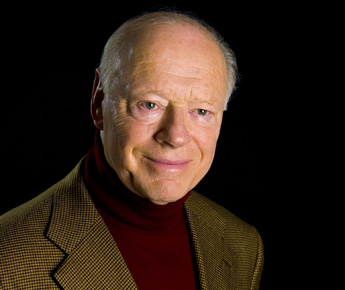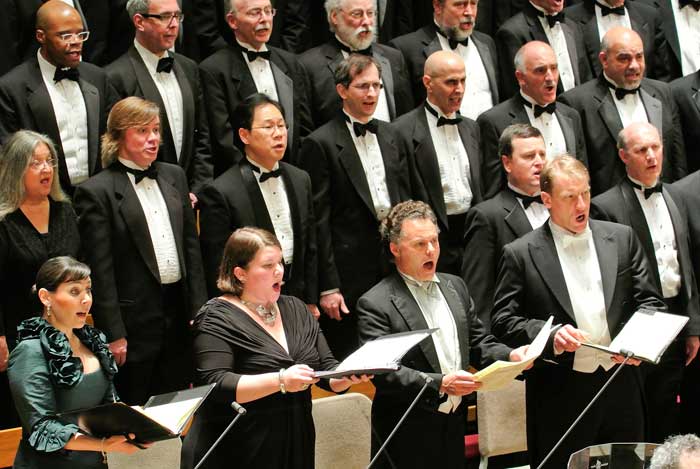Concert Review: Boston Symphony Orchestra/Bernard Haitink at Symphony Hall
Beethoven’s Symphony No. 9 is a piece the BSO trots out with greater regularity of late than most orchestras (as Tanglewood aficionados are aware, it’s been the traditional summer closer each August for about a decade now), and, while such familiarity may not exactly breed complacency, it certainly runs the risk of so doing.
By Jonathan Blumhofer

Conductor Bernard Haitink — conductors tend to slow as they age, but this 83-year-old is the picture of youth.
“Many people consider Beethoven’s Ninth Symphony to be the greatest piece of music ever written,” Igor Stravinsky is reported to have said. “I have often wondered why.” Whether or not the quote is apocryphal, the Boston Symphony Orchestra (BSO) presented the “Choral” Symphony in all its strange glory as the final work on its 2011-2012 subscription season this past weekend at Symphony Hall. Appropriately, it shared billing with Stravinsky’s BSO-commissioned Symphony of Psalms. Conductor emeritus Bernard Haitink was on the podium, leading the orchestra, Tanglewood Festival Chorus (TFC), and soloists Jessica Rivera, Meredith Arwady, Roberto Saccá, and Günther Groissböck.
When Serge Koussevitzky led the first BSO performances of the Symphony of Psalms in December 1930, the piece was played twice (once before intermission, once after), and it shared the program with Mozart’s Symphony no. 40, Stravinsky’s Capriccio, and Schoenberg’s orchestration of Bach’s “St. Anne” Prelude and Fugue. How’s that for creative programming? The logic for pairing it this time around with Beethoven’s Ninth wasn’t entirely clear before or after the performance—two major composers making deeply personal, religious statements a century apart?—but, perhaps, we don’t need a deeper connection than that they’re two pieces that show off the TFC and BSO in dramatic fashion.
The Stravinsky opened strongly, with a first movement marked by fine diction from the TFC and reined-in-but-propulsive energy from the BSO. The two subsequent movements, though, were a bit of a let down: intonation faltered in the chorus and orchestra in the second movement (both ensembles were at least a quarter-tone apart on its last chord), and the TFC’s diction was frustratingly muddled. By the time the finale rolled around, technical issues improved, but, interpretively, there seemed a disconnect. The big, plodding sonorities at the end of the movement can have a magical, transcendent feel but on Saturday passed by without yielding much, either for good or ill.
Beethoven’s Ninth made for an interesting close to this year’s subscription series. As the capstone to Mr. Haitink’s acclaimed, three-week residency with the orchestra, it is most appropriate, and, coming at the end of a year that was somewhat lacking in artistic direction, it’s a safe creative choice for a season-ender (as well as a big box office draw—all three concerts were sold out). It’s a piece the BSO trots out with greater regularity of late than most orchestras (as Tanglewood aficionados are aware, it’s been the traditional summer closer each August for about a decade now), and while such familiarity may not exactly breed complacency, it certainly runs the risk of so doing.
Happily, with Mr. Haitink on the podium, Saturday’s performance was anything but. Some reports of earlier concerts in the series found this Ninth to be a shaky affair that never really got off the ground; by the last night, though, just about everybody involved was in a groove.
While I’ve heard performances of the first movement that start with a bit more mystery, Mr. Haitink drew a well-paced, dramatic reading of one of Beethoven’s longest symphonic essays. The BSO emphasized all the hallmarks of Beethoven’s distinctive late style, from the sudden shifts of texture and mood to extremes of dynamics and character, with great energy and attention to detail. And while it would have been nice to get a sense of wilder abandon in some of the cascading string figures in the movement’s exposition and recapitulation, Mr. Haitink’s restraint led to some mighty powerful climaxes.
The middle movements, too, were nicely etched. A couple of ragged moments aside, the fugue in the second movement Scherzo was appropriately motoric, like a danse diabolique, while the contrasting D major trio was sunny and warm. Mr. Haitink’s take on the luminous, slow third movement was anything but sentimental: if conductors tend to slow as they age, the 83-year-old Mr. Haitink is the picture of youth. Saturday’s performance emphasized the lyrical qualities of Beethoven’s writing in a fresh, flowing reading that featured some fine brass and wind solos in the orchestra.
Of course any performance of the Ninth lives or dies with the last movement, and here some problems crept in. Certainly Beethoven didn’t go easy on his interpreters: this is a movement of byzantine formal design that demands the utmost in concentration and technique. On the whole, Mr. Haitink drew a cogent performance of this familiar music from the BSO and vocalists. There were a few moments, though, particularly in the opening orchestral recitative, that could have been more manic and unruly, especially in the recurring, bitonal “terror fanfare” that opens the movement.

Soloists Jessica Rivera, Meredith Arwady, Roberto Sacca and Gunther Groissbock perform with the Boston Symphony Orchestra and Tanglewood Festival Chorus
Regardless, the famous “Ode to Joy” tune unfolded in the orchestra with a nice sense of inevitability and, once bass Günther Groissböck ushered in Schiller’s verse, palpable enthusiasm. It was good to hear a native German speaker like Mr. Groissböck (an Austrian who was making his BSO debut) intoning this German text: try nobly as they might, the TFC has a tendency to introduce an American twang into their German enunciation (particularly on “e’s” and “ö’s”), though they kept it in pretty good control Saturday night. After the somewhat haphazard Stravinsky, their diction in the Symphony was consistently clear and crisp and their intonation was solid.
The vocal quartet—which, in addition to Mr. Groissböck, included Ms. Rivera, Ms. Arwady, and Mr. Saccá—was more of a mixed bag. The outer singers, Ms. Rivera and Mr. Groissböck, shone, with Mr. Groissböck’s enormous tone and volume proving to be about as ideal for the opening monologue as one could imagine. Ms. Arwady and Mr. Saccá, though, were less distinct, particularly the former: she was often covered by the other singers, and when she sang out her voice had a shrill, piercing tone to it that proved rather abrasive.
Still, there’s something about imperfection in performances of the Ninth that can make for very intense and memorable concert experiences: it’s a piece that’s all about creating unity out of discord, after all, and ultimately in Saturday’s finale, that theme came across with thrilling immediacy.
Saturday’s concert marked the final subscription series performances of two longtime orchestra members, bass trombonist Douglas Yeo and violist Marc Jeanneret, both of whom are retiring this summer. Between them, they’ve provided the BSO with over 62 years of service, and both were rewarded with multiple rounds of rousing cheers from the audience and their colleagues on-stage when concertmaster Malcolm Lowe brought them forward for their post-concert bows.
